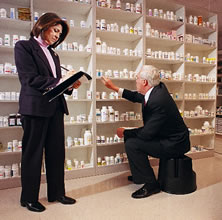
In the terminology of the Drug Enforcement Administration, diversion is the use of prescription drugs for recreational purposes. The term comes from the "diverting" of the drugs from their original purposes.
note: Drug Diversion may also refer to programs available to first time drug law infractors which "divert" them from the criminal system to a program of education and rehabilitation.
Drugs that are diverted, in an approximate order of popularity
- Opioids (opium analogues) such as hydrocodone and OxyContin. These have similar effects to opium and heroin.
- Pseudoephedrine-containing drugs sold over the counter are used as an ingredient to make methamphetamine.
- DXM, the active ingredient of Robitussin, is abused for its effects which are similar to Ketamine and PCP.
- Depressants such as Valium.
- Antidepressants, which are often essentially stimulants, and are often snorted by abusers.
The DEA is doing some work to try and stop drug diversion. For example, sales of Pseudoephedrine are limited in certain stores.
Some critics feel that the importance of drug diversion is glossed over in the media and popular discussion. For example, in the recent case of Rush Limbaugh being accused of abusing pain-killers, it was felt by some that the similarity between the pain killers and heroin was not made clear. The higher dose pills of prescription pain killers are often stronger than the street rock heroin sold in most cities, and are preferred or at least used indiscriminately by opiate drug abusers.
Some critics contend however that drug diversion has been purposely allowed to happen, primarily by opioid manufacturers who profit off of the addiction of their customers. They also point to new products such as "dex-alone" which is a pill marketed specifically that it contains pure DXM without other compounds which would have an adverse effect at the levels of abuse.
Registration of drug suppliers
21 U.S.C. § 822 of the Controlled Substances Act provides for registration of manufacturers and distributors of Scheduled substances. The criteria for registering manufacturers of Schedule I and II drugs are particularly strict and call for "limiting the importation and bulk manufacture of such controlled substances to a number of establishments which can produce an adequate and uninterrupted supply of these substances under adequately competitive conditions for legitimate medical, scientific, research, and industrial purposes". The Attorney General must make a positive determination that the registration would be "consistent with the public interest".
For manufacturers of other drugs, and for drug distributors, the regulations are substantially less strict: "The Attorney General shall register an applicant . . . unless he determines that the issuance of such registration is inconsistent with the public interest". The criteria for both manufacture and distribution is somewhat biased in favor of established industries, favoring "past experience" and a record of compliance with drug laws[1].




 216.73.216.2
216.73.216.2 User Stats:
User Stats:
 Today: 0
Today: 0 Yesterday: 0
Yesterday: 0 This Month: 0
This Month: 0 This Year: 0
This Year: 0 Total Users: 117
Total Users: 117 New Members:
New Members:
 216.73.xxx.x
216.73.xxx.x
 Server Time:
Server Time: